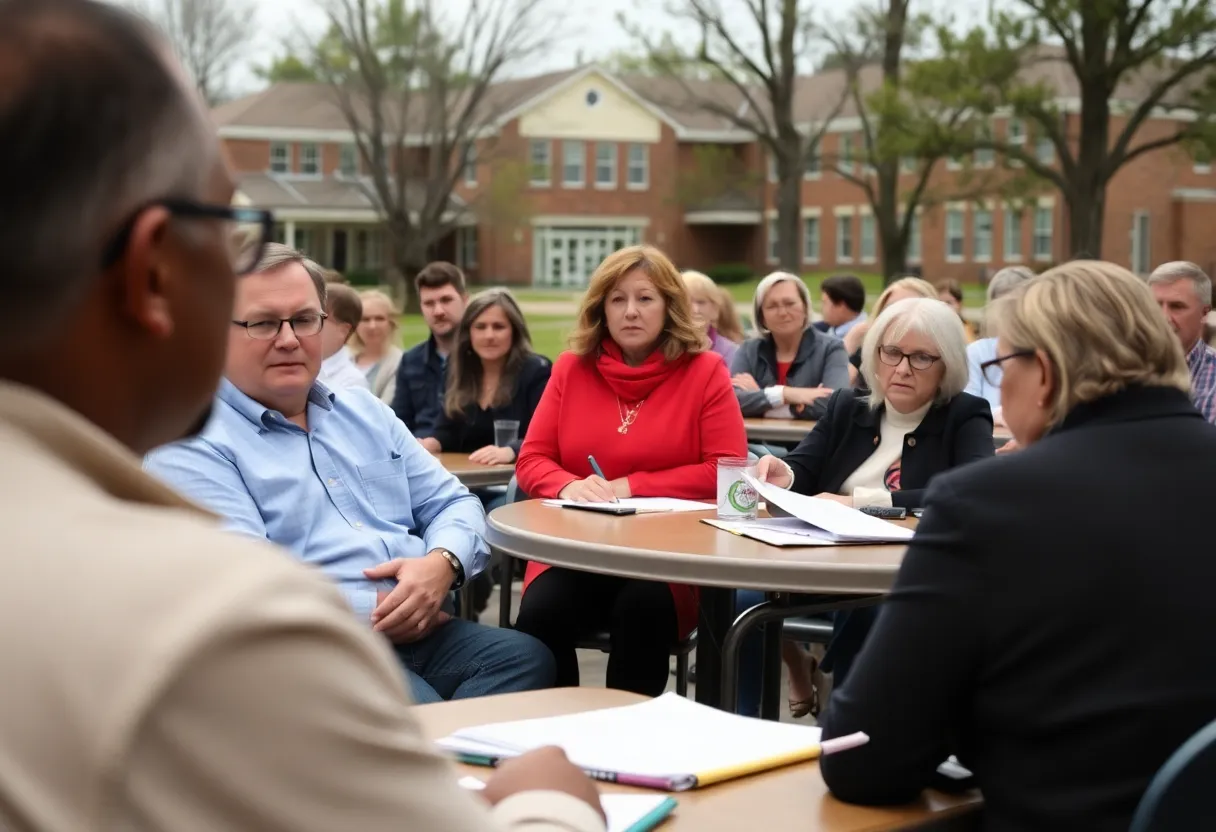News Summary
At a recent town hall meeting in Asheville, educators gathered to voice their concerns over proposed budget shortfalls that may impact local schools. The Buncombe County budget proposal fails to meet the funding requests from Asheville City Schools and Buncombe County Schools, leading to fears of job losses and inadequate resources. The meeting highlighted the urgent need for balanced budget discussions as the community faces increased demand for school capacities due to population growth. With a final budget vote approaching, educators and parents stress the importance of full funding for quality education.
Asheville, North Carolina – Hundreds of educators gathered at a town hall meeting on Tuesday night, organized by the Buncombe County and Asheville City Association of Educators at A-B Tech, to express their concerns over proposed budget shortfalls impacting local schools. The current budget proposal for Buncombe County does not fulfill the funding requests made by both Asheville City Schools (ACS) and Buncombe County Schools (BCS), raising fears of potential job losses and inadequate educational resources.
Asheville City Schools had requested nearly $21 million for the upcoming budget but is instead projected to receive about $17.3 million. Similarly, Buncombe County Schools requested approximately $106 million, with a proposed allocation of around $95.8 million. The discrepancies in these figures have educators worried about the implications for their job security, with instances such as the uncertainty expressed by the ACS String Orchestra Director illustrating the pressures faced by staff.
Attending the town hall were Commissioners Jen Horton, Drew Ball, Parker Sloan, and Martin Moore, who engaged with the community, stressing the importance of robust public education funding. Commissioner Moore noted the community’s commitment to supporting quality schools while emphasizing the need for balanced budget discussions that consider the needs of both educational institutions and the county’s financial landscape.
Population growth in southern Buncombe County is further complicating the budget discussions as it increases demand on local school capacities. For instance, William W. Estes Elementary is currently utilizing modular units to accommodate its students. There are over 1,100 new residential units planned in the Roberson district, which may exacerbate the strain on school facilities, even as there have been slight declines in overall public school enrollment.
Superintendent Rob Jackson acknowledged the community’s concerns regarding both school capacity and the projected growth in student numbers. In response to these challenges, the Buncombe County Board of Education is exploring potential capital financing options, such as a general obligation bond, to secure funding for necessary expansions and improvements to school facilities.
In addition to budgetary challenges, the school board made headlines recently by voting to eliminate the uniform requirement at Charles T. Koontz Intermediate School. This decision was prompted by a student-led survey that indicated significant disapproval from students, parents, and teachers regarding the uniforms. Moreover, the school board also decided to increase student parking fees at high schools from $60 to $80 per year, the first increase since 2020, although provisions will be made for low-income families to receive waivers.
Attendance at the public hearing concerning the county’s proposed budget reflected widespread frustration among community members regarding inadequate funding for schools. The budget is scheduled for a final vote on June 3, raising significant concern among parents and educators about potential cuts to educational programs and staffing levels.
The Buncombe County school board has faced backlash for perceived funding cuts that seem to disproportionately affect educational services compared to other county programs. There is mounting pressure to restore funding for early childhood education programs and to prevent further staff reductions, especially concerning positions that directly impact students.
Public discussions continue to emphasize the necessity of collaboration between school districts and county commissioners to effectively tackle funding shortages and adequately address the educational needs of the community. The town hall underscored the urgency of advocating for full funding to ensure the sustainability and quality of education in Asheville and Buncombe County.
Deeper Dive: News & Info About This Topic
HERE Resources
UNC Asheville Receives Historic $5 Million Donation
North Carolina Fire Departments Enhance Community Safety with Smoke Alarm Saturday
Asheville Teachers Celebrated by Local Baseball Team
UNC Asheville Dismisses Dean Over DEI Policy Comments
Columbia University Faces Accreditation Threat Over Antisemitism Claims
University of North Carolina at Charlotte Terminates DEI Advocate
North Carolina Public Universities Suspend DEI Course Requirements
Asheville Establishes Business Improvement District for Downtown
Asheville Schools Prepare for Budget Cuts
UNC Asheville Music Department to Receive $1 Million Donation
Additional Resources
- WLOS: Asheville School Funding Town Hall
- Mountain X: Future Capacity Needs in Schools
- WLOS: Buncombe County Budget Passes
- Mountain X: Concerns Over Title I Funding
- WLOS: Searching for Alternate Funding
- Wikipedia: Education in North Carolina
- Google Search: Buncombe County Schools
- Google Scholar: School Funding North Carolina
- Google News: Asheville School Budget
Author: STAFF HERE ASHEVILLE WRITER
The ASHEVILLE STAFF WRITER represents the experienced team at HEREAsheville.com, your go-to source for actionable local news and information in Asheville, Buncombe County, and beyond. Specializing in "news you can use," we cover essential topics like product reviews for personal and business needs, local business directories, politics, real estate trends, neighborhood insights, and state news affecting the area—with deep expertise drawn from years of dedicated reporting and strong community input, including local press releases and business updates. We deliver top reporting on high-value events such as the Asheville Bread Festival, LEAF Festival, and mountain sports tournaments at Biltmore Estate. Our coverage extends to key organizations like the Asheville Area Chamber of Commerce and Explore Asheville Convention & Visitors Bureau, plus leading businesses in hospitality and brewing that power the local economy such as the Biltmore Estate and Sierra Nevada Brewing Company. As part of the broader HERE network, including HERECharlotte.com, HEREGreensboro.com, HERERaleigh.com, and HEREOBX.com, we provide comprehensive, credible insights into North Carolina's dynamic landscape.





